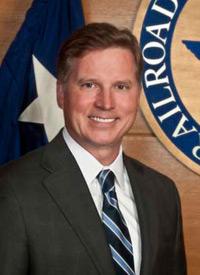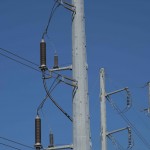At House Hearing, Water Issues Dominate
When water became scarce in Texas last year, scrutiny quickly fell on the state’s burgeoning energy industry. Proposed new coal plants had trouble getting water permits. And hydraulic fracturing drillers faced accusations of groundwater contamination and excessive water use.
But at the House joint hearing on energy and natural resources held last Wednesday, industry leaders gave representatives their side of the story.
At the hearing, Texas Railroad Commissioner David Porter defended the gas industry and hydraulic fracturing (or fracking).
“Even if we didn’t use another drop of water for drilling operations, water is still going to be an issue because of the drought and our state’s tremendous population growth. I want to be very clear. Hydraulic fracturing should not be the scapegoat for the water shortage in Texas,” said Porter.
Fracking has grown rapidly alongside the development of the Eagle Ford Shale in South Texas and the Barnett Shale play. But industry experts deny accusations of heavy water use. Lance Robertson, Vice President for Marathon Oil Company (which operates in the Eagle Ford) described how the industry might increasingly turn to something called waterless fracking.
“We converted 100% of our hydraulic fracture stimulation systems operations from slickwater – which is higher volumes of water – to a crosslink system.” said Robertson.
Marathon’s waterless fracking operations make use of a thick gel made from guar beans, which look a lot like green beans. And according to Robertson, Marathon’s move to waterless fracking has reduced water consumption by forty percent in the first ninety days of operations. And the company has also tried to use non-potable water resources for drilling as opposed to Texas’ precious groundwater supplies.
But Luke Metzger, the Director of Environment Texas, said that technologies like waterless fracking aren’t being used across the board.
“We’ve heard of course some great testimony today of some of the technologies available to save water that are being used in some parts, but we don’t think nearly enough,” said Metzger at the hearing.
In his statement, Metzger claimed that fracking has had a considerable impact on local water supply. He recommended that the state should monitor the amount of water used for fracking on a per county or district basis to get a clearer image of the situation.
In addition to water use, the hearing also touched on federal regulation. Representatives and industry panelists alike made references to last week’s ruling on EPA’s greenhouse gas regulations. Many openly disapproved of the decision.
Phillip Barry, environmental manager of the Sabine Mining Company in Hallsville, claimed such federal regulation could jeopardize Texas’ energy security when Texans need energy the most.
“If CSAPR had passed, we would have been looking at blackouts this summer … especially if we’re going to get another two to three weeks of one hundred degree temperature, ” said Barry.
CSAPR, or the EPA‘s Cross-State Air Pollution Rule, would have required states to improve air quality by reducing power plant emissions contributing to ozone or fine particle pollution. For Barry, the rule amounted to an open attack.
And the on-going hee-haw over coal wasn’t left out of the discussion either.
“Contrary to what you may have read and what the EPA wishes, coal is here to stay as a key component of power generation and is necessary to keep the lights on, ” said Chairman of the Texas Railroad Commission, Barry Smitherman.
But in a press statement prepared last week, the Sierra Club maintained that more should be done to wean Texas off of coal.
“As Texas tries to cope with recurring droughts it is incumbent on all of us – citizens and public officials alike – to take the steps necessary to become more energy efficient and reduce our demands for electric power generation while also continuing to move toward less water intense power sources such as wind power and distributed solar,” said Ken Kramer, the Director of the Sierra Club’s Lone Star Chapter.
The Sierra Club maintains that coal-fired power plants require more water than alternative technologies. A report conducted on behalf of the Sierra Club earlier this year supports this conclusion.
Beyond the hearing, Texas water and energy concerns have continued to raise eyebrows.
In an Environmental Defense Fund (EDF) blog post, the reliability assessment manager at the North American Electric Reliability Corporation (NERC), John Moura, underscored the critical link between Texas’ water and energy needs.
“If power lines go down, the wind stops blowing or drought forces a power plant to stop sucking up water to cool its equipment, the state could be in trouble,” said Moura.
The Electric Reliability Council of Texas (ERCOT) has been gearing up to deal with this scenario. But as temperatures continue to push past 100, many – industry leaders, interest groups, and consumers alike – look on with baited breath.





